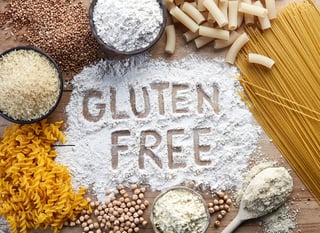
Celiac disease and non-celiac sensitivity is at an all-time high in America.
Picture this, you are out to dinner with friends or family. You also have celiac or gluten/insensitivity. You order something gluten-free off the menu, but throughout the course of the night you accidentally ingest something containing gluten. What do you do? For most people this means quietly excepting your fate, but what if there was a way to tolerate small amounts of gluten and not experience severe pain, if any at all? Well although this seems too good to be true; it's not. Researchers have discovered an enzyme that can do just that.
In a recent randomized placebo-controlled trial of 18 adults, gluten-sensitive patients who consumed an enzyme supplement derived from Aspergillus niger could better tolerate small amounts of gluten with less pain. The data was presented at the annual Digestive Disease Week.
The enzyme, Aspergillus. niger-derived prolyl endoprotease (AN-PEP), has demonstrated the ability to degrade gluten into nonimmunogenic compounds in vivo in healthy subjects. Participants in the study attended the test site for 3 days, consuming a porridge containing approximately 0.5 g of gluten in the form of two crumbled wheat cookies. They were randomized to consume two tablets that contained 160,000 PPI of AN-PEP, 80,000 PPI, or a placebo. The participants’ gastric and duodenal content was sampled several times over 180 minutes and analyzed for gluten epitopes using an enzyme-linked immunosorbent assay test. Participants also completed questionnaires after each day of testing.
After taking the enzyme in conjunction with the gluten, stomach gluten content averaged 31 microg x min/mL in the high-dose and low-dose enzyme patients (P = 0.001 for both doses), compared with 281 microg x min/mL in the placebo patients.
By the time the gluten reached the duodenum, the average levels had dropped to 12 microg x min/mL in the high-dose patients (P = 0.019) and 8 microg x min/mL in the low-dose patients (P = 0.015), compared with an average of 65 microg x min/mL in the placebo patients.
The researchers said that overall the enzyme was well tolerated by the patients. It was also emphasized that the tablet is meant to help avoid symptoms when celiac patients encounter small amounts of gluten, that these patients should still follow a gluten-free diet.
AN-PEP is available in the United States in supplement form under several names and is manufactured by the Dutch company DSM. The AN-PEP enzyme used in the study was provided by DSM, but the company provided no other support.
If you think you are gluten-sensitive, ask your licensed practitioner to order a celiac panel, food allergy tests for gluten, both IgE and IgG and genomic testing (HLADQ2 and HLADQ8) to identify an underlying predisposition. Most of these can be ordered through regular labs and are covered by insurance. Cyrex Labs, a specialty lab, goes further to identify cross-reactive gluten-free foods like: tapioca, amaranth, oats, corn, sweet potato, dairy, etc. Just because you remove gluten from your diet does not guarantee an inflammation-free gastrointestinal tract. In those cases, all grains must be removed in order for the gut to heal.
Test, test, test before you switch to a gluten-free diet. Once diagnosed, switch to a gluten-free diet and I recommend grain-free diet for faster healing. Avoiding grains heals the gut and prevents further complications from grain intolerance.
Once allergens are diagnosed, we create an emergency treatment plan for acute episodes after accidental exposures. Take GOOD GUT Probiotics + immune and GOOD GUT Repair. I recommend Xymogen's HistDao for added protection and a specialized probiotics for infants from Klaire Labs that you can order from Emerson Ecologics through our virtual pharmacy. Probiotics modulate the immune system and help to prevent allergic conditions like atopic dermatitis.


